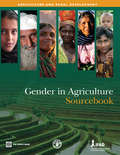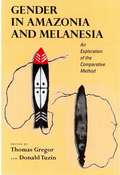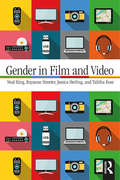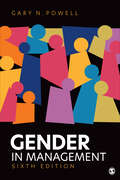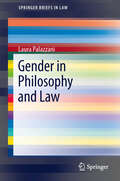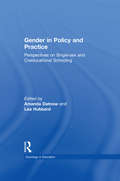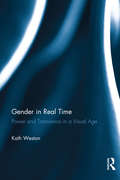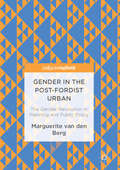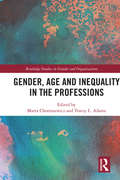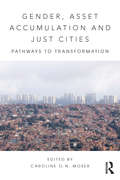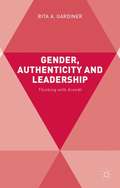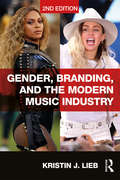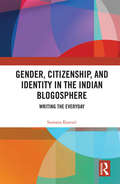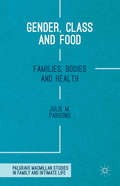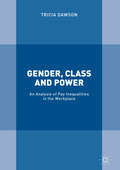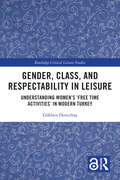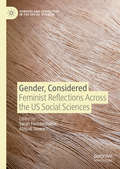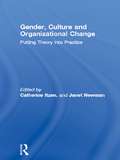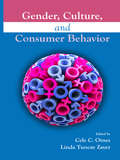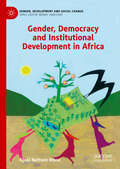- Table View
- List View
Gender in Agriculture Sourcebook
by World Bank International Fund for Agricultural Development Food And Agriculture OrganizationThe 'Gender in Agriculture Sourcebook' provides an up-to-date understanding of gender issues and a rich compilation of compelling evidence of good practices and lessons learned to guide practitioners in integrating gender dimensions into agricultural projects and programs. It is serves as a tool for: guidance; showcasing key principles in integrating gender into projects; stimulating the imagination of practitioners to apply lessons learned, experiences, and innovations to the design of future support and investment in the agriculture sector. The Sourcebook draws on a wide range of experience from World Bank, Food and Agriculture Organization (FAO), International Fund for Agricultural Development (IFAD), and other donor agencies, governments, institutions, and groups active in agricultural development. The Sourcebook looks at: access to and control of assets; access to markets, information and organization; and capacity to manage risk and vulnerability through a gender lens. There are 16 modules covering themes of cross-cutting importance for agriculture with strong gender dimensions (Policy, Public Administration and Governance; Agricultural Innovation and Education; Food Security; Markets; Rural Finance; Rural Infrastructure; Water; Land; Labor; Natural Resource Management; and Disaster and Post-Conflict Management) and specific subsectors in agriculture (Crops, Livestock, Forestry, and Fisheries). A separate module on Monitoring and Evaluation is included, responding to the need to track implementation and development impact. Each module contains three different sub-units: (1) A Module Overview gives a broad introduction to the topic and provides a summary of major development issues in the sector and rationale of looking at gender dimension; (2) Thematic Notes provide a brief and technically sound guide in gender integration in selected themes with lessons learned, guidelines, checklists, organizing principles, key questions, and key performance indicators; and (3) Innovative Activity Profiles describe the design and innovative features of recent and exciting projects and activities that have been implemented or are ongoing.
Gender in Amazonia and Melanesia: An Exploration of the Comparative Method
by Thomas A. Gregor Donald TuzinThe contributors to this innovative volume illuminate the various ways in which sex and gender are elaborated, obsessed over, and internalized, shaping subjective experiences common to entire cultural regions, and beyond.
Gender in Film and Video
by Neal King Rayanne Streeter Jessica Herling Talitha RoseGender in Film and Video tracks changes in gender on screen by documenting trends of the internet age. The jargon-free book focuses on six instances of media in transition and their histories, including the rise of feminism on television, in sports events, and in comedy-drama series; the growth of DIY production by underrepresented groups through crowdfunding and YouTube channels; and struggles between fans and producers over control of casting and storytelling. This volume focuses on the breakdown of the categories (content, production, reception) that top-down production/distribution in TV and cinema tended to keep distinct. This text is for students in sociology, media studies, and women’s and gender studies.
Gender in Management
by Gary N. PowellIn the Sixth Edition of Gender in Management, author Gary N. Powell provides a comprehensive survey and review of the literature on sex, gender, and organizations. With the title change from Women and Men in Management to Gender in Management, the new edition adopts a more inclusive lens that acknowledges the diverse identities and experiences within the gender spectrum. Fully updated sections on intersectionality, public events such as COVID-19 and the Black Lives Matter movement, and the prevalence of AI in hiring decisions provide context to the evolving nature of gender in the workplace and society. Powell provides specific research-based strategies for promoting an organizational culture of nondiscrimination, diversity, and inclusion.
Gender in Management
by Gary N. PowellIn the Sixth Edition of Gender in Management, author Gary N. Powell provides a comprehensive survey and review of the literature on sex, gender, and organizations. With the title change from Women and Men in Management to Gender in Management, the new edition adopts a more inclusive lens that acknowledges the diverse identities and experiences within the gender spectrum. Fully updated sections on intersectionality, public events such as COVID-19 and the Black Lives Matter movement, and the prevalence of AI in hiring decisions provide context to the evolving nature of gender in the workplace and society. Powell provides specific research-based strategies for promoting an organizational culture of nondiscrimination, diversity, and inclusion.
Gender in Philosophy and Law
by Laura PalazzaniThis book is an introductory systematic framework in the complex and interdisciplinary sex/gender debate, focusing on philosophy of law.The volume analyses the different theories that have dealt with the gender category, highlighting the conceptual premises and the arguments of the most influential theories in the debate, which have had repercussions on the field of the ethical and juridical debate (with reference to intersexuality, transsexualism, transgender, homosexuality). The aim is to offer a sort of conceptual orientation in the complexity of the debate, in an effort to identify the various aspects and development processes of the theories, so as to highlight the conceptual elements of the theorisations to grasp the problem areas within them. It is therefore an overall synthetic and also explicative analysis, but not only explicative: the aim is to outline the arguments supporting the different theories and the counter-arguments too, for the purpose of proposing categories to weigh up the elements and to take one's own critical stance, with a methodological style that is neither descriptive nor prescriptive, but critical.
Gender in Policy and Practice: Perspectives on Single Sex and Coeducational Schooling (Sociology in Education)
by Lea Hubbard Amanda DatnowThis book exposes the complexity of single-sex schooling, and sheds new light on how gender operates in policy and practice in education. The essays collected in this volume cover a wide range of institutions, including K-12 and higher education, public and private schools, and schools in the US and beyond. Detailing the educational experiences of both young men and women, this collection examines how schooling shapes-and is shaped by- the social construction of gender in history and in contemporary society.
Gender in Real Time: Power and Transience in a Visual Age
by Kath WestonFirst published in 2003. Routledge is an imprint of Taylor & Francis, an informa company.
Gender in Spanish Urban Spaces
by Maria C. DiFrancesco Debra J. OchoaThis edited collection examines the synergistic relationship between gender and urban space in post-millennium Spain. Despite the social progress Spain has made extending equal rights to all citizens, particularly in the wake of the Franco regime and radically liberating Transici#65533;n, the fact remains that not all subjects--particularly, women, immigrants, and queers--possess equal autonomy. The book exposes visible shifts in power dynamics within the nation's largest urban capitals--Madrid and Barcelona--and takes a hard look at more peripheral bedroom communities as all of these spaces reflect the discontent of a post-nationalistic, economically unstable Spain. As the contributors problematize notions of public and private space and disrupt gender binaries related with these, they aspire to engender discussion around civic status, the administration of space and the place of all citizens in a global world.
Gender in the Post-Fordist Urban
by Marguerite van den BergThis book investigates the gender revolution in urban planning and public policy. Building on feminist urban studies, it introduces the concept of genderfication as a means of understanding the consequences of post-Fordist gender notions for the city. It traces the changes in western urban gender relations, arguing that in the post-Fordist urban landscape gender is used for urban planning and public policy – both to rebrand a city’s image and to produce space for gender-equal ideals, often at the cost of precarious urban populations. This is a topic that remains largely unexplored in critical urban studies and radical geography. Chapters cover how Jane Jacobs’ perspectives provide an alternative to the patriarchal modernist city for contemporary planners and using Rotterdam as a case study Van Den Berg discusses why new urban planning methods focus on attracting women and children as new urbanites. Topics include: forms of place marketing, gender as a repertoire for contemporary urban Imagineering and the concept of urban re-generation. The final chapter investigates how cities aiming to redefine themselves imagine future populations and how they design social policies that explicitly and particularly target women as mothers. Scholars in all fields of urban studies will find this work thought-provoking, instructive and informative.
Gender, Age and Inequality in the Professions: Exploring the Disordering, Disruptive and Chaotic Properties of Communication (Routledge Studies in Gender and Organizations)
by Marta Choroszewicz Tracey L. AdamsThe literature on gender and professions shows that professional careers continue to be impacted by gender – albeit with important differences among professions and countries. Much less researched is the issue of the significance of gender and age-cohort or generation to professional work. Gender, Age and Inequality in the Professions explores men’s and women’s experiences of professional work and careers through an intersectional lens by focusing on the intersection of gender and age. The chapters explore different professions – including Medicine, Nursing, Law, Academia, Information Technology and Engineering – in different Western countries, in the present and over time. Through original research, and critical re-analysis of existing research, each of the chapters explores the significance of gender and age-cohort or generation to professional work, with particular attention to professionals just entering professional careers, those building professional careers, and comparisons of men and women in professions across generational cohorts. The book contributes to literature on inequalities in the professions by demonstrating the ways in which gender and age converge to confer privilege and produce disadvantage, and the ways in which gender inequality is reproduced, and disrupted, through the activities of professionals on the job. The book constitutes a departure point for future research in terms of theoretical perspectives and empirical findings on how gendered and age-related processes are produced and reproduced in particular organisational, professional and socio-cultural contexts. To enhance generational understanding, relationships and collaboration in educational institutions, organisations and professions, the book ends with a section on policy recommendations for educators, professionals, professional organisations as well as policy- and decision-makers. This book will also appeal to students and researchers in the fields of Sociology, Gender Studies, Organisational and Management Studies, Law, Medicine, Engineering and Information Technology as well as related disciplines.
Gender, Asset Accumulation and Just Cities: Pathways to transformation
by Caroline O.N. MoserWith more than half the world’s population now living in urban areas, urbanisation is undoubtedly one of the most important phenomena of the 21st century. However, despite increasing recognition of the critical relationship between economic and social development in cities, gender issues are often overlooked in understanding the complexities of current urbanisation processes. This book seeks to rectify this neglect. Gender, Asset Accumulation and Just Cities explores the contribution that a focus on the gendered nature of asset accumulation brings to the goal of achieving just, more equitable cities. To date neither the academic debates nor the formulated policy and practice on just cities has included a focus on gender-based inequalities, discriminations, or opportunities. From a gender perspective, a separate discourse exists, closely associated with gender justice, particularly in relation to urban rights and democracy. Neither, however, has addressed the implications for women’s accumulation of assets and associated empowerment for transformational pathways to just cities. In this book, contributors specifically focus on gender and just cities from a wide range of gendered perspectives that include households, housing, land, gender-based violence, transport, climate, and disasters.
Gender, Authenticity and Leadership: Thinking with Arendt
by Rita A. GardinerThis book examines the conceptual underpinnings of authentic leadership to discover why so little attention has been paid to gender. The author explores the failure to interrogate the complexities surrounding the concept of authenticity, especially as it relates to the diversity of lived experience.
Gender, Branding, and the Modern Music Industry: The Social Construction of Female Popular Music Stars
by Kristin J. LiebGender, Branding, and the Modern Music Industry combines interview data with music industry professionals with theoretical frameworks from sociology, mass communication, and marketing to explain and explore the gender differences female artists experience. This book provides a rare lens on the rigid packaging process that transforms female artists of various genres into female pop stars. Stars—and the industry power brokers who make their fortunes—have learned to prioritize sexual attractiveness over talent as they fight a crowded field for movie deals, magazine covers, and fashion lines, let alone record deals. This focus on the female pop star’s body as her core asset has resigned many women to being "short term brands," positioned to earn as much money as possible before burning out or aging ungracefully. This book, which includes interview data from music industry insiders, explores the sociological forces that drive women into these tired representations, and the ramifications for the greater social world.
Gender, Citizenship, and Identity in the Indian Blogosphere: Writing the Everyday
by Sumana KasturiThis book examines the role of women bloggers in the Indian Blogosphere. It explores how women use new media technologies to create online spaces that share knowledge, raise awareness, and build communities. A unique work at the intersection of digital culture, feminist theory, and diaspora/transnationalism studies, this book brings to light layered and complex issues such as identity, gender performativity, presentation of self, migration, and citizenship. This volume will be useful for scholars and researchers of cultural studies, political studies, gender studies, women’s studies, sociology, diaspora studies, feminist theory, media and communication studies.
Gender, Class and Food: Families, Bodies and Health (Palgrave Macmillan Studies in Family and Intimate Life)
by Julie M. ParsonsEveryday foodways are a powerful means of drawing boundaries between social groups and defining who we are and where we belong. This book draws upon auto/biographical food narratives and emphasises the power of everyday foodways in maintaining and reinforcing social divisions along the lines of gender and class.
Gender, Class and Power: An Analysis Of Pay Inequalities In The Workplace
by Tricia DawsonWith a particular focus on the British printing industry, this book tackles the ongoing issue of pay inequality and examines the challenges facing many women today. By analysing organisation processes within the workplace, the author considers the unequal allocation of power resources that generate and sustain women’s invisibility and argues that women’s power is often outflanked by that of their male colleagues. Written by a skilled academic with direct industry experience, this new book is an insightful read for those researching human resource management (HRM), women’s studies and diversity, as well as trade union officials and policy-makers.
Gender, Class and Reflexive Modernity in India (Genders and Sexualities in the Social Sciences)
by Jyothsna Latha BelliappaUsing in-depth interviews, this book explores women employed in the Indian IT industry and highlights the gender specific and culturally specific consequences of reflexive modernity in neo-liberal India.
Gender, Class, and Respectability in Leisure: Understanding Women’s ‘Free Time Activities’ in Modern Turkey (Routledge Critical Leisure Studies)
by Gökben DemirbaşThis book interrogates the role of gender and class in shaping women’s everyday leisure practices. Drawing on empirical research in urban Turkey, the book explores how leisure is perceived and practised by women within their communities.The book examines the relationship of women’s leisure to their labour, women’s access to and uses of public leisure spaces, and the dynamics of their everyday sociability within their neighbourhoods. It is the first book to apply Skegg’s concept of ‘respectability’ – socially recognised judgments and standards which label the ‘right’ practices, that hold morality and power in a given context – as a theoretical tool with which to understand leisure in a country in which modernisation and Westernisation have been a central dynamic shaping political, social, and cultural life. This analysis reveals that two measures of gendered respectability – reproductive work and the honour code – and how they mediate with the classed measures of respectability, are essential to understanding women’s leisure practices in the Turkish context. The book argues that these interactions are likely shared in many Global South countries, including Islamic societies. Therefore, this analysis shines important new light on women’s experiences more broadly, and on the social, political, and cultural dynamics of traditional social structures in a modernising world.This book is fascinating reading for anybody with an interest in leisure studies, women’s studies, sociology, cultural studies, or Middle East studies.
Gender, Considered: Feminist Reflections Across the US Social Sciences (Genders and Sexualities in the Social Sciences)
by Abigail J. Stewart Sarah FenstermakerThis book gathers reflections from 15 US based feminist social scientists about gender – as orienting framework, as one aspect of an intersectional approach, as a feature of intellectual identity, and as a problematic construct. Gender as an analytic, dynamic concept has had an important impact within and across social sciences in the past several decades. That impact for some arose in dialogue with interdisciplinary women’s studies, and was sometimes troubled both in women’s studies and in relation to other interdisciplines and disciplines. As a new generation of gender scholars embarks on their careers in social science, Fenstermaker and Stewart's collection provides scholars an opportunity to reflect on the course of different disciplinary histories and autobiographies, as well as illuminate individual scholarly craft and disciplinary direction as our understanding of gender has unfolded over time. The volume will also represent one kind of collective wisdom to inspire younger scholars.
Gender, Culture and Organizational Change: Putting Theory into Practice
by Janet Newman Catherine ItzinAn engaging contribution to the increasing body of knowledge about gender and organizations, Gender, Culture and Organizational Change examines gender-based inequality in organizations and considers how sexual and social relations between women and men based on sexuality, power and control determine the cultures, structures and practices of organization and the experiences of men and women working in them. Gender, Culture and Organizational Change represents a decade of experience of managing change and implementing theory in public sector organizations during a period of major social, political and economic transition and analyses the progress that has been made. It expands to make wider connections with women and trade unions in Europe and management development for women in the "developing" countries of Africa and Asia. It will be valuable reading for students in social policy, gender studies and sociology and for professionals with an interest in understanding the dynamics of the workplace.
Gender, Culture, and Consumer Behavior
by Cele C. Otnes Linda Tuncay ZayerThis book covers the gamut of topics related to gender and consumer culture. Changing gender roles have forced scholars and practitioners to re-examine some of the fundamental assumptions and theories in this area. Gender is a core component of identity and thus holds significant implications for how consumers behave in the marketplace. This book offers innovative research in gender and consumer behavior with topics relevant to psychology, marketing, advertising, sociology, women’s studies and cultural studies. It offers 16 chapters of cutting-edge research on gender, international culture and consumption. Unique to this volume is its emphasis on consumption and masculinity and inclusion of topics on a rapidly changing world of issues related to culture and gender in advertising, communications, psychology and consumer behavior.
Gender, Democracy and Institutional Development in Africa (Gender, Development and Social Change)
by Njoki Nathani WaneThis book analyses African foundations of gender, education, politics, democracy and institutional development by stimulating theoretical discourses. It offers a discursive framework on ways to examine the conceptualizations of African social development and a critical discourse on debunking the misconceptions that are attached to African location in the global arena. The volume challenges the danger of minimizing and oversimplifying the role of Africa in the international space. This will be ideal for researchers, students and scholars in the areas of African and gender studies, development, politics and education.
Gender, Development and Environmental Governance: Theorizing Connections (Routledge Research in Gender and Society #33)
by Seema Arora-JonssonA major challenge in studies of environmental governance is dealing with the diversity of the people involved at multiple levels – villagers, development agents, policy-makers, private resource users and others – and taking seriously their aspirations, conflicts and collaborations. This book examines this challenge in two very disparate parts of our world, exploring what gender-equality, resource management and development mean in real terms for its inhabitants as well as for our environmental futures. Based on participatory research and in-depth fieldwork, Arora-Jonsson studies struggles for local forest management, the making of women’s groups within them and how the women’s groups became a threat to mainstream institutions. Insights from India, consistently ranked as one of the most gender-biased countries, are compared with similar situations in the ostensibly gender-equal Sweden. Arora-Jonsson also analyzes how dominant ideas about the environment, development and gender equality shape the spaces in which women and men take action through global discourses and grassroots activism. Questioning the conventional belief that development brings about greater gender equality and more efficient environmental management, this volume scrutinizes how environmental imaginations are key to crafting gender relations. It shows gender to be at the heart of environmental negotiations while at the same time making a case for environmental sensibilities as integral to gender relations. At the confluence of development, environmental and gender studies, the book contributes to a much-needed dialogue between these fields, proposing new futures in environmental management.
Gender, Disability, and Tourism in Africa: Intersectional Perspectives (Sustainable Development Goals Series)
by Erisher Woyo Hellen VenganaiThis book explores the intersection of gender and disability in the context of tourism. In part, the book foregrounds feminist theorising of intersectionality by examining how gender can overlap with other social identities to contribute to more systemic oppression, domination, discrimination, and marginalisation of certain categories of people. Our point of departure is that disability does not operate in isolation as it is constituted and experienced within an already gendered social and tourism environment. With substantial research on the intersection of gender and tourism on the one hand, and the intersection of disability and tourism on the other hand, the interconnectedness of gender and disability and the implications this has on tourism policy and practice remains understudied. Thus, the book provides a critical lens that helps unpack underlying assumptions about gender and disability while questioning the dominant ideas about gender and disability reproduced through tourism policies and institutional practices in an African context. This book will be of interest to scholars and researchers in Gender Studies, Disability Studies, and Tourism Studies, particularly those with a research interest in Africa.
